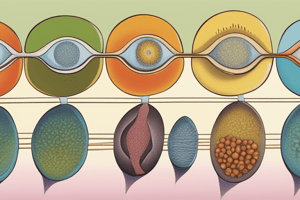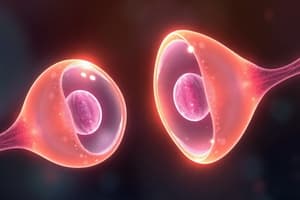Podcast
Questions and Answers
What is the main advantage of sexual reproduction over asexual reproduction?
What is the main advantage of sexual reproduction over asexual reproduction?
- Increased genetic variation (correct)
- Lower investment of time, energy, and resources
- Reduced adaptability
- Decreased genetic variation
Which process ensures genetic variation in the offspring by combining gametes from two different individuals?
Which process ensures genetic variation in the offspring by combining gametes from two different individuals?
- Asexual reproduction
- Outcrossing (correct)
- Self-fertilization
- Sequential hermaphroditism
What is one of the challenges of sexual reproduction compared to asexual reproduction?
What is one of the challenges of sexual reproduction compared to asexual reproduction?
- Decreased adaptability
- Shorter reproductive cycle
- Increased investment in time, energy, and resources (correct)
- Lower genetic variation
In what cases does self-fertilization commonly occur?
In what cases does self-fertilization commonly occur?
What allows individuals to develop resistance to pathogens in sexual reproduction?
What allows individuals to develop resistance to pathogens in sexual reproduction?
Which process involves some species changing sex over their lifetimes?
Which process involves some species changing sex over their lifetimes?
What is the main purpose of sexual reproduction?
What is the main purpose of sexual reproduction?
What is the result of meiosis in the process of sexual reproduction?
What is the result of meiosis in the process of sexual reproduction?
What is the role of fertilization in sexual reproduction?
What is the role of fertilization in sexual reproduction?
What is the process called in females where meiosis produces a single haploid egg cell?
What is the process called in females where meiosis produces a single haploid egg cell?
How does meiosis in males differ from meiosis in females during sexual reproduction?
How does meiosis in males differ from meiosis in females during sexual reproduction?
Why is sexual reproduction considered essential for genetic diversity?
Why is sexual reproduction considered essential for genetic diversity?
Flashcards are hidden until you start studying
Study Notes
Reproduction: Unlocking Life's Cycle through Sexual Interaction
Reproduction is a fundamental biological process, ensuring the continuation of species. In the context of this article, we'll delve into the specifics of sexual reproduction, which involves the combining of genetic material from two individuals of the same species.
The Basics of Sexual Reproduction
Sexual reproduction occurs when gametes (sex cells) from two organisms fuse together, forming a zygote. The zygote, developed into a new organism, contains a unique genetic makeup, a blend of genetic information from both parents.
Meiosis
Before sexual reproduction occurs, a process called meiosis happens in the diploid (2n) cells of the parents. Meiosis results in the formation of haploid (n) gametes, each containing half the number of chromosomes of the parent.
Fertilization
Upon meeting, gametes from the two sexes combine to form a single diploid zygote. This event, known as fertilization, is essential for sexual reproduction.
Types of Sexual Reproduction
- Oogenesis: In females, meiosis produces a single haploid egg cell, called an ovum. In some species, this process is called oogenesis.
- Spermatogenesis: In males, meiosis produces many sperm cells, each containing only one copy of each chromosome. In some species, this process is called spermatogenesis.
Variations in Sexual Reproduction
- Outcrossing: This occurs when gametes from two different individuals combine, ensuring genetic variation in the offspring.
- Self-fertilization: In some cases, a single individual may fertilize its own gametes. This is common in plants and some animals.
- Sequential hermaphroditism: Some organisms, like some species of fish, change sex over their lifetimes, often mating with their former mates.
Advantages of Sexual Reproduction
Sexual reproduction has several advantages over asexual reproduction, including:
- Genetic variation: By combining genetic material from two parents, sexual reproduction produces a more genetically diverse population, increasing the likelihood of survival.
- Immunity: Genetic variation allows individuals to develop resistance to pathogens, increasing their chances of survival.
- Adaptation: Genetic variation enables species to adapt to changing environments.
Challenges and Adaptations in Sexual Reproduction
- Investment: In most species, sexual reproduction involves a larger investment in time, energy, and resources compared to asexual reproduction.
- Costs: Sexual reproduction can lead to a decrease in population size due to a longer reproductive cycle.
In conclusion, sexual reproduction is a fundamental process ensuring genetic variation, adaptability, and the continuation of life on our planet. It is a complex process that involves meiosis, fertilization, and genetic variation. Understanding sexual reproduction is essential to comprehending the evolution and conservation of species.
Studying That Suits You
Use AI to generate personalized quizzes and flashcards to suit your learning preferences.




